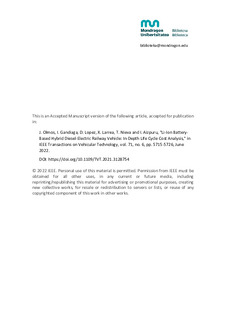| dc.contributor.author | Aizpuru, Iosu | |
| dc.contributor.other | Olmos Amondarain, Josu | |
| dc.contributor.other | Gandiaga Ondaro, Iñigo | |
| dc.contributor.other | López, Dimas | |
| dc.contributor.other | Larrea Agirre, Xabier | |
| dc.contributor.other | Nieva Fatela, Txomin | |
| dc.date.accessioned | 2022-11-10T12:23:14Z | |
| dc.date.available | 2022-11-10T12:23:14Z | |
| dc.date.issued | 2022 | |
| dc.identifier.issn | 1939-9359 | en |
| dc.identifier.other | https://katalogoa.mondragon.edu/janium-bin/janium_login_opac.pl?find&ficha_no=167710 | en |
| dc.identifier.uri | https://hdl.handle.net/20.500.11984/5827 | |
| dc.description.abstract | In this study, the life cycle costs of railway projects involving hybrid diesel-electric vehicles are analysed. Specifically, the analysis focuses on the comparison of 3 lithium-ion battery technologies (NMC, LTO and LFP) and 8 energy management strategies (including rule-based and optimization-based strategies). In order to develop this analysis, a methodology that returns the life cycle cost of each proposed case is presented. The methodology includes the optimization of the diesel generator and lithium-ion battery sizing. A scenario based on a real railway line is introduced, and the obtained results are compared to a traditional diesel-electric railway vehicle to develop a techno-economical discussion. The best lithium-ion battery technologies are found to be LTO and NMC, and the most appropriated strategy a state-machine controller optimised by a genetic algorithm approach. The best case obtains a life cycle cost reduction of the 4.0% and diesel savings of the 13.7% compared to a traditional diesel-electric railway vehicle. The proposed analysis is claimed to be potentially helpful for the cost-optimal design and operation definition of powertrains for hybrid railway vehicles. | en |
| dc.description.sponsorship | Gobierno Vasco-Eusko Jaurlaritza | es |
| dc.language.iso | eng | en |
| dc.publisher | IEEE | en |
| dc.rights | © 2022 IEEE | en |
| dc.subject | Rail transportation | en |
| dc.subject | Costs | en |
| dc.subject | optimization | en |
| dc.subject | Mechanical power transmission | en |
| dc.subject | Energy management | en |
| dc.subject | Analytical models | en |
| dc.subject | Hybrid power systems | en |
| dc.title | Li-ion Battery-based Hybrid Diesel-Electric Railway Vehicle: In-depth Life Cycle Cost Analysis | en |
| dcterms.accessRights | http://purl.org/coar/access_right/c_f1cf | en |
| dcterms.source | IEEE Transactions on Vehicular Technology | en |
| local.contributor.group | Almacenamiento de energía | es |
| local.contributor.group | Accionamientos aplicados a la tracción y a la generación de energía eléctrica | es |
| local.description.peerreviewed | true | en |
| local.description.publicationfirstpage | 5715 | en |
| local.description.publicationlastpage | 5726 | en |
| local.identifier.doi | https://doi.org/10.1109/TVT.2021.3128754 | en |
| local.relation.projectID | info:eu-repo/grantAgreement/GV/Programa Bikaintek 2018/20-AF-W2-2018-00010/CAPV// | en |
| local.embargo.enddate | 2023-11-30 | |
| local.contributor.otherinstitution | https://ror.org/03hp1m080 | es |
| local.contributor.otherinstitution | https://ror.org/02afbgp72 | es |
| local.source.details | Vol. 71. N. 6. Pp. 5715-5726. June, 2022 | en |
| oaire.format.mimetype | application/pdf | |
| oaire.file | $DSPACE\assetstore | |
| oaire.resourceType | http://purl.org/coar/resource_type/c_6501 | en |
| oaire.version | http://purl.org/coar/version/c_ab4af688f83e57aa | en |







